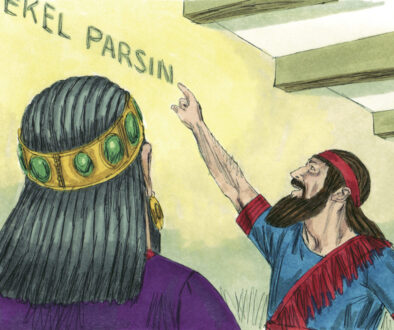Genesis 41 Grain A Plenty

Joseph has just been given charge over all of Egypt. For the next 7 years, ALL of Egypt will be growing grain a plenty! And Joseph calls for a portion of it.
There is no way Joseph came up with this plan on the spot on his own. It had to be Spirit inspired. Joseph didn’t even know what Pharaoh’s dreams were until that moment. He received the interpretation from God AND the plan on how to survive it. Pharaoh recognized where the wisdom came from too.
Pharaoh promoted Joseph to the second in command in ALL of Egypt. He introduced him to those in the city, and now, he sends him out to put God’s plan into action. Let’s join Joseph as he follows God’s leading.
♥ ♦ ♥
It’s Joseph’s first day of ‘work’ as the governor of the land. There is much to do, and each step in this process is important. He makes a list:
- Survey the land for appropriate places to erect storehouses.
- Purchase the land in question so none but Pharaoh can claim it as their own
- Purchase using script/vouchers
- Ensure that script/voucher is honored in exchange for gold upon request
- Inform the people about what is going to take place
- 1/5th to Pharaoh
- Each city stores its own
- If you don’t work, you don’t eat
- The stores belong to Pharaoh
- They will be expected to purchase Pharaoh’s goods
- Erect store houses in EACH city
- Procure material
- Hire workers
- Monitor progress
- Build more storehouses as the need arises
- Ensure compliance by monitoring crops and harvests
- Keep accurate records
- Post guards to prevent theft in lean time
- Establish fair prices
Once Joseph is satisfied with his list, he presents it to Pharaoh.
“Steps 1-3 must begin immediately” Joseph tells Pharaoh.
“This looks like a sound plan” Pharaoh says while handing Joseph back his parchment.
“I will need gold and silver to purchase the property and the materials. I can use slaves for the labor, but I must ensure that they are adequately fed in order to perform their tasks.”
Pharaoh nods. “Take whatever you need. My storehouse is open to you.”
“An accurate record will be kept from beginning to end my master.”
“I’m certain it will. I trust you with all I have. May your God grant you wisdom and success; for yourself and all of Egypt.”
Joseph bows and then sets off for Pharaoh’s treasury. He plans on purchasing the property with script because it would be too easy to be robbed moving around with that much gold. He has to make arrangements with those in charge of Pharaoh’s treasury to honor the scripts that he gives the people.
It took very little time at all to come up with an agreeable format for the script Joseph would be handing out. Included will be the name of the person, what is purchased, the price paid, the date of purchase, and the seal of Pharaoh’s signet ring that Joseph wears. None without the seal will be honored.
Joseph is now ready to set out on his journey throughout all of Egypt. There can be NO quarter left undone. EVERY city must be surveyed and storehouses constructed. And EVERY person in Egypt MUST know of their duty to Pharaoh. NONE can claim ignorance.
As Joseph rises his second morning as governor, Asenath prepares his morning meal. Joseph marvels at how quickly he became a husband. “It would not be so in my Abba’s house” he thinks. Joseph barely knows this woman he now calls his wife. He hopes he will come to love her in time.
“I will be gone for quite some time” he tells Asenath as she serves him. “If you have need of anything, you have but to ask and it will be done. I have left word with the captain of the guards to see to your wellbeing and safety. I trust him with my life.”
“I will be well my husband” she replies. “I know I have to share you with all Egypt. I just wish you didn’t have to leave so soon.”
“All has to be ready before the harvest. Egypt will need every kernel of grain she can lay her hands on for the years ahead. I cannot waste a moment.”
“I understand my husband. I await your return.”
Joseph graces Asenath with a gentle touch on her cheek, then goes to his chariot.
It takes three months for Joseph to travel to EVERY city and town in Egypt. Three days are spent in each. In those three days, Joseph first finds and purchases the property where the storehouse will be built. Second, he hires or commandeers slaves for the work and purchases material.
“These men are to be treated with great respect” Joseph demands of the overseers. “On their backs rests Egypt’s future. They are to be given food to eat, clothes to wear, and tools for their labor. ANY who are hired men will receive wages instead. It is their responsibility to spend their wages to maintain their ability to work.” Joseph looks each overseer in the eyes before turning over the project requirements. “These men will NOT be mistreated. But ANY who will not work will NOT receive any portion of their wages.” Joseph then looks over his work force. “Any who won’t work, will not eat. It is as simple as that. Do your jobs well and you will be rewarded for your efforts.”
The final day in each location is spent in meeting with all the people surrounding the city. A notice of this meeting is always posted on the first day, as well as a runner dispatched from those traveling with Joseph to ensure that everyone knows the time and place of this meeting.
“Your assistance and honor to your Pharaoh is required” Joseph begins each meeting. “For those of you who have no already heard, the Lord God of Heaven and Earth has sent Pharaoh a warning of what is to come. He has promised 7 good years of plenty, followed by 7 years of famine. It is our job, together, to prepare for the years of famine.
“Each of you will bring a FULL 1/5th of all you harvest each year to the storehouse that will stand on this very spot. It is not too long of a journey for each of you. Nor is Pharaoh’s portion too much to ask. God has promised great abundance during this time.
“You are expected to save from your own portions for yourselves in the time to come. The storehouses will remain locked until they are absolutely needed. Only then will you be allowed to purchase stores from Pharaoh.
“Those who attempt to rob Pharaoh of any of his portion will be thrown in prison and all their harvest forfeit. ANY who refuses to work, will NOT eat. Together, we will make it through all the years ahead.”
There are few questions asked once Joseph completes telling the people of their responsibilities, and of Pharaoh’s. The people leave with the knowledge they will need in the coming years and the confidence that their Pharaoh will protect them.
A single storehouse in each town and city is ready by the days of the first harvest. Joseph posts guards and a bookkeeper with each storehouse. “Record each person’s name, what they are harvesting, and the amount contributed to Pharaoh’s storehouse. Require an accounting of all they have harvested also.”
Joseph is exhausted from his travels by the time he reaches his home. Asenath is very glad to see him.
“How long can you stay my husband?”
“I have a week to spend with you” Joseph says with a smile.
“I will take it!”
Joseph and Asenath begin to learn about one another during the week. They share their hopes and dreams. Joseph even shares his dreams about his brothers and parents bowing down to him.
“It may happen my husband. As you are ruler of all of Egypt, second only to Pharaoh himself.”
“Yes. But they don’t live in the land of Egypt.” Joseph thinks over this issue. “Maybe they will be drawn by the famine” he thinks to himself.
Joseph’s heart begins to turn to Asenath during this week together. He prays that hers is turning to him also. Time will tell.
Joseph has little time to stay at home over the first seven years. His longest stays happen during the winter when the land is fallow. He is able to spend three weeks each year during that season. He comes home to Asenath every few months for shorter visits throughout the year too.
On one of Joseph’s visits home, Asenath has a surprise for Joseph. As soon as he walks in the door, he can tell that something is up. Asenath has clearly gone to great lengths to make their home look festive. Banners fly from the windows and buntings are tied to the pillars. Joseph raises an eyebrow at Asenath when she flies down the steps to greet him.
“What is with all this?” Joseph asks with a smile.
“It is to welcome the father of my child home” replies Asenath with a twinkle in her eye.
“So, I’m to be an Abba” Joseph says as he picks up Asenath and carries her back into their home.
They spend a wonderful week together before Joseph has to return to his duties. His heart aches to spend time with her and watch his child develop within his wife, but his duties will not permit it. At one point, Joseph thought about bringing Asenath with him on his journey, but dismissed it as too difficult for her; especially now that she is pregnant.
Joseph’s next visit is only two days away when Asenath’s time to deliver arrives. She has the best midwife in all of Egypt attending her. Pharaoh himself saw to this.
“You couldn’t wait just two more days” Asenath tells her child while still within her.
“Labor could take days, but I wouldn’t wish that on ANY woman” says the midwife to Asenath.
“NO. Today will be fine! I’m certain that my husband will be pleased to be spared having to hear me scream in pain.”
“As they all would.” The midwife shakes her head. “If the men had to birth the children, there would never be another child born after their first” she chuckles.
“We women are a special breed” says Asenath as the pain rise in her. “Maybe I’ll not have another one” she says through gritted teeth.
The midwife laughs. “You will change your mind one day. But let’s get this one into the world before we worry about a second or third child.”
Asenath is awed by the face of her child as the midwife places him in her arms. “You were worth every minute of it” she says to him. The midwife helps her settle him on her breast. Asenath can’t take her eyes off of him and she envisions Joseph meeting him the first time.
“Your Abba will be home soon, and he will be overjoyed to have a son” she whispers.
Two days later, Joseph arrives home. He rushes into his home to find his wife. A runner had been dispatched from Pharaoh to tell him he had a son. He is as excited as a child looking forward to his first ceremony.
Asenath is sitting on a cushion when Joseph sees her. He approaches with care, so as not to disturb the babe who is sleeping.
“He is beautiful” Joseph says through choked back tears.
“He is.”
The two of them stare at the babe for a while before Asenath asks Joseph and important question.
“What is our child’s name?”
“His name is Manasseh. ‘For God has made me forget all my hardship and all my father’s house’ (verse 51).”
Joseph only had a few days to spend with his wife and son before he had to return to his tasks. He made certain to get every moment he could out of this visit. NO work at all. Only bonding time with his growing family.
During the fourth year of plenty, Joseph was again surprised by Asenath when she announced that she was again carrying his child. Manasseh had been weaned right before Joseph’s visit which resulted in Asenath’s announcement. Joseph was disappointed that Egypt didn’t honor the weaning of a child like his Abba’s house did. But he made it special for Manasseh by bringing him a gift from one of the farthest cities in Egypt. It was a carving of a camel for him to play with.
When Joseph’s second son arrived, he was home for a short visit. “This time we waited for you” Asenath told Joseph after their son was placed in his arms.
“And I’m so glad you did!” Joseph looked at his son and gave him a name. “His name is Ephraim, ‘for God has made me fruitful in the land of my affliction’ (verse 52).”
Joseph was pleased with the preparations that had been made during the seven years of plenty. By the end of that last harvest, the amount in Pharaoh’s storehouses was so great that it couldn’t be counted! Each city had several storehouses filled to the very top. And the people had also heeded Joseph’s words about storing up for themselves a portion. Joseph also had placed men who could be trusted to follow his commands when the time of famine came. Each storehouse was well protected and kept locked until the day when it was required to keep the people alive.
The years of plenty have ended. Joseph is bracing himself for what lies ahead. “Now to see if all the hard work was enough” thinks Joseph. He trusted his God for his own life. And he has put ALL of Egypt into God’s hands too. “Prove Your faithfulness O God of my Abba’s. Help me lead this people.”
Joseph’s travels were less in the first year of the famine. He monitored the depletion of the people’s storehouses. He would not open Pharaoh’s storehouses until the peoples’ were emptied. In the second year of the famine, there were no crops at all being harvested. The water in the Nile was running dangerously low. No rain had fallen since the end of the seven years of plenty.
Finally, the people began to cry out for bread. Their storehouses were empty. Pharaoh turned them to Joseph. “Go to Joseph. What he says to you, do” (verse 55b).
Joseph finally opened the storehouses in the early part of second year of the famine. Egypt was not the only one suffering hunger. All the lands around them were also in this same drought and famine. The people from these lands heard of Pharaoh’s storehouses and came in seek of food. Joseph was a shrewd bargainer and he set the prices for all who would come. He also resumed his traveling duties between the storehouses. He had to monitor the amount coming out of each, as well as be handy to bargain with those from other lands.
(to be continued)
One thing I want to point out is the location of the storehouses. Joseph has them constructed in each city. What EACH city grew was put in the storehouses within its boundaries. In other words, one city would not be allowed to hold all the reserves. Nor would one city be exempt from contributing. They would receive back from what THEY had been stored up through THEIR labors. There was NO ‘free ride’ for any city. Nor was there a ‘distribute the wealth’ policy for those who had less. If you don’t work, you don’t eat.
I have a question here. Did Joseph circumcise his sons while in Egypt? We don’t see anything about it in our text. We also know that the Israelites were not circumcised when they left the land of Egypt. They had to do it on the road. Just something I started pondering.
Father God, You never fail to amaze me! I know that I’ve heard this story MANY times. Thank You for taking me a little deeper in it today. I wish I had the ‘strength’ or imagination to go even deeper. Maybe Joseph will tell me the story as it really happened when I’m in heaven. I look forward to that day whey I can finally hear ‘the rest of the story’.



